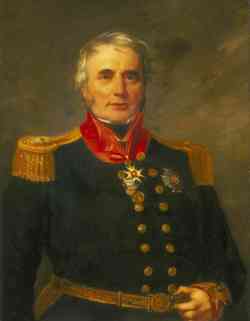James Alexander Gordon |
|
|---|---|
| Born | 10/6/1782 in Kildrummy, Aberdeenshire, Scotland |
| Died | 1/8/1869 in Greenwich |
Biography |
|
Overview
Born in Wardhouse (Aberdeenshire), Gordon joined the navy as a midshipman in 1793. He was successful in campaigns against French and Spanish privateers (1805-8), but in 1811 Gordon lost a leg at Lissa (now Vis, in the Adriatic). He took part in an action against the Americans on the Potomac (1812). He went on to occupy various senior positions, culminating in his promotion to Admiral of the Fleet in 1868, just a year before his death. GORDON, Sir James Alexander, British naval officer, born about 1782; died in Greenwich hospital, England, 8 January 1869. He entered the navy in 1793, and rose rapidly in his profession. He was at the battle of the Nile, served in the West Indies, the Mediterranean, and the Adriatic-commanded the frigate "Active" at the battle of Lissa, for which he received a gold medal and a pension of £300, and, at the capture of the French frigate "La Pomone," had a leg carried away by a 36-pounder. In August, 1814, with a squadron under his command, he entered the Potomac, reduced Fort Washington and other batteries, and subsequently forced the City of Alexandria to capitulate. He also took part in the operations against New Orleans in 1814-'15. In 1827 he was appointed governor of the royal naval hospital at Plymouth. In 1840 he became lieutenant governor of Greenwich hospital, and in 1853 was advanced to the post of governor of that establishment. Altogether he served in the navy nearly seventy-six years, and was the last survivor of Lord Nelson's band of captains. He was created a K. C.B, in 1815 ; in 1854, G. C. B. ; and became admiral of the fleet in 1868. At an early age he was present in the 'Goliath', 74 guns, at the Battles of St Vincent in 1797 and the Nile, 1798. While commanding the frigate 'Active', 38 guns, in the Mediterranean, he played a distinguished part in Captain William Hoste's action off Lissa in 1811. Hoste's three frigates and a 22-gun sixth-rate comprised the sole Royal Naval strength in the Adriatic. They fought an action against an attacking Franco-Venetian squadron off the island of Lissa, where the British were based and although outnumbered managed to defeat the invaders. All four British captains were awarded gold medals. In the same year Gordon lost a leg while capturing the Franco-Venetian 'Pomone', 40 guns, near Corfu, and in 1814 he commanded a squadron against the Americans. He was later the last Governor of Greenwich Hospital, dying just before it closed in 1869. Exceptionally, he was buried (under a handsome granite tombstone) in the officers' enclosure of its old burial ground, adjacent to the National Maritime Museum, although other burials there had ceased in 1857. |
|
 Admiral of the Fleet Sir James Alexander Gordon, KCB, RN (6 October 1782 – 8 January 1869) was a distinguished British officer in the Royal Navy. His 75 years in the service, from Midshipman to Admiral of the Fleet was unprecedented in its duration. He served in the Napoleonic Wars and the War of 1812. Historian Bryan Perrett has suggested that his career was the model for events in the Horatio Hornblower novels of C. S. Forester.
Admiral of the Fleet Sir James Alexander Gordon, KCB, RN (6 October 1782 – 8 January 1869) was a distinguished British officer in the Royal Navy. His 75 years in the service, from Midshipman to Admiral of the Fleet was unprecedented in its duration. He served in the Napoleonic Wars and the War of 1812. Historian Bryan Perrett has suggested that his career was the model for events in the Horatio Hornblower novels of C. S. Forester.